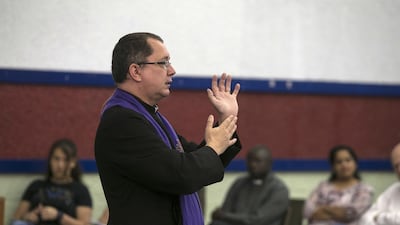The catastrophic and tragic events in Paris and in Beirut have reinforced fears in the West that all Muslims are inevitably a threat to democracy and to people of other faiths. This is simply a lie.
Terrorists who define themselves as Muslim are a minuscule percentage of the world’s Islamic population. The vast majority of Muslims are appalled by this violence, condemn it and are often victims of terrorism themselves.
I believe one way to counteract the stereotype of Muslims in the West, is by educating those who are not familiar with Islamic countries and presenting an alternative narrative.
My position as a British Christian leader in Abu Dhabi has given me a unique platform in which to speak of an Islamic people who truly embody a faith which embraces “the other’’ in a spirit of acceptance and friendship.
I went to the UK recently to present some of those alternative narratives. One question was put to me regularly during several meetings I had with politicians during my visit: “Dubai is part of Saudi Arabia ... right?”
It highlighted one of the challenges that the ambassador of the UAE faces when it comes to discussing affairs of the Arabian Gulf in London.
Saudi Arabia came up a lot. The common assumption held by members of the audience was that this was the context in which I was ministering as a priest. This was typified by the following comment, usually delivered with great sympathy when I walked into an MP’s office: “I guess you are here to tell me about Christian persecution!”
That pretty much summed up the expectations of individuals I met in the corridors and coffee bars of the House of Lords.
I was in London at the invitation of Abdulrahman Ghanem Almutaiwee to present an alternative narrative of religious freedom in contrast to the bad news coming out of the Middle East.
I had no idea it would be so difficult. I set out to educate these British politicians that the Christian community is not being persecuted in this authentically Islamic nation in the heart of the Arabian Gulf.
Far from it.
The UAE is more than just tolerant, which is the minimum concession a state might make to religious minorities.
In fact, the UAE has enshrined protection of religious minorities into federal law. This summer, an anti-discrimination law came into effect with great acclamation from the global community.
Even more than that, the ruling families have generously given land to allow people of other faiths to build their places of worship. Even more incredibly, there are several known instances where the authorities have made donations in order to enable the completion of church buildings.
When we compare the number of church centres in the UAE with the other GCC states we see a startling difference. Saudi Arabia has none, Kuwait has four, Oman has four, Bahrain has five and Qatar has just started allowing churches to be built in the past five years.
The UAE, by contrast, has more than 40 centres of Christian worship and a gurdwara (a Sikh temple, the only one in the entire Middle East). It has also just granted land for a Hindu temple to be built.
Good news indeed, and several responses received during my meetings in the UK included statements of encouragement, hope, praise – and puzzlement.
The latter was provoked by their understanding that Islam in the Middle East was not supposed to allow freedom of worship. Surely this was only possible in a secular and democratic state?
Deep breath, as I sought to explain that there is nothing inherent in Islam which required a de facto prejudice against non-Muslims. My respect for the ambassador of the UAE grew as I realised what he was up against. Later I was interviewed by the BBC.
Unfortunately, my narrative of good news from the Middle East was bumped by a report on the suffering and persecution of Christians in the Middle East.
I do not wish to diminish the awfulness and the horror that my co-religionists are going through, but the media attention on the “bad states” seems only to affirm their evil behaviour.
For once, it would be good for the global media to tell a more nuanced report of the region they sweepingly call the Middle East.
The Reverend Canon Andrew Thompson MBE is senior Anglican chaplain of St Andrew’s Church, Abu Dhabi and author of Jesus of Arabia and Christianity in the UAE

